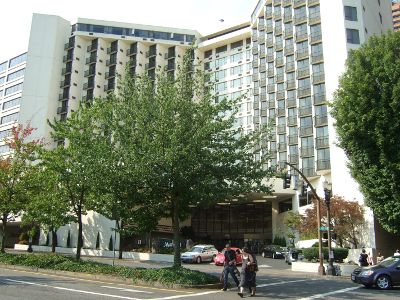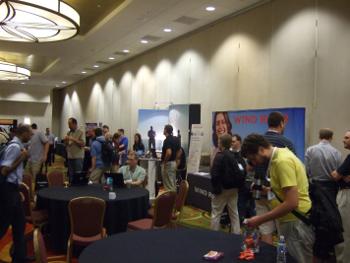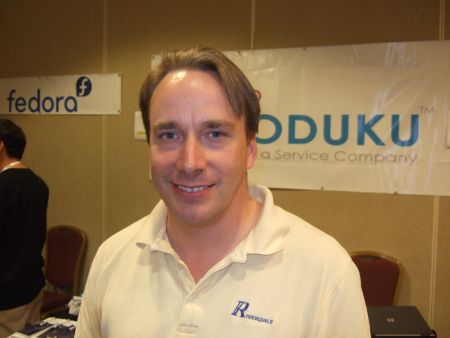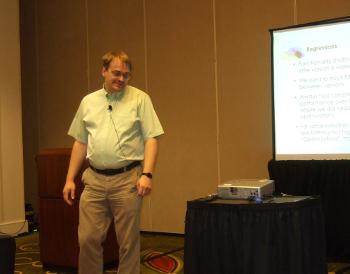PCLinuxOS User at LinuxCon

Galen Seaman (gseaman)
It was three beautiful days in Portland, Oregon. This was my first Linux Conference and my first time to see any of the people involved in creating my favorite OS. I didn't know what to expect, but I was very excited to attend.

Marriot Hotel

Willamette River

Downtown Portland
For readers who are not familiar with Portland I included a couple of pictures to give you a sense of the environment surrounding this event. The group hosting the event was the Linux Foundation, http://www.linuxfoundation.org/, located here in Portland and the employer for Linus Torvalds and several of the key kernel hackers.
The event was a series of keynote talks, with other specialized talks in between geared toward developers, business, and operations (networking). The biggest event was the kernel developers roundtable with Linus Torvalds, Jon Corbett, Theodore T'so, Greg Kroah-Hartman, Chris Wright and James Bottomley. The was also another gathering for developers happening at the same location that started on Wednesday, called the Linux Plumbers Conference.

Vendors
There was a website setup for the event to encourage everyone attending to contact others with similar interests and purpose for attending. Although they billed this event as being for all Linux Users, it appeared that almost everyone attending worked for IBM, Novell, Redhat, Intel, Suse, Canonical or one of the other vendors with booths at the conference. Linux is definitely big business. I don't view this as a problem as long as these business don't try to subvert the GPL License which allows all of this cooperation to work to everyone's advantage.

Linus Torvalds
Regular readers of the PCLinuxOS forums might know that one of my interests is music software. At the roundtable, I had the opportunity to ask the panel about kernel developments and music production. Several of the panelist replied. Linus Torvalds said that sound is the weakest part of the kernel, but that it is not nearly as bad as people posting to Slashdot say that it is. He said that those who say that things were better when Linux used OSS don't know what they are talking about. Jon Corbet, kernel contributor and co-founder of LWN.net, said that there are issues with PulseAudio which have caused problems for many distributions, and that although this is a userspace program, they were aware of it. He also suggested if anyone has improvements, we (the kernel hackers) are taking patches.
During the roundtable, the panelists talked about how effective and efficient the workflow has become and how many patches are going into the kernel. Linus said that people are sending the patches the way he wants them, so he is happy. This led James Bottomley, the moderator and a kernel developer, to ask Linus about the size of the kernel. Linus responded that the kernel was bloated and that it was not the lean kernel he originally envisioned. At least one blogger has made a big deal out of this comment. I think this has been sensationalized. My interpretation of this comment is that with all of the amazing flexibility and stability going into the kernel, Linus is aware of the growth and is looking for solutions. This is encouraging.
Being a desktop user, I have noticed less responsiveness in recent kernels and I was glad to hear Jon Corbet acknowledge the contributions Con Kolivas has made to the kernel scheduler. Con used to work on the scheduler to make it linux more responsive, but quit about two years ago when Linus asked Ingo Molnar to write a completely new scheduler based on some of the ideas of Con's schedular but using entirely new code. This scheduler, called CFS (Completely Fair Scheduler) was reasonably better than the previous kernel, but the kernel has regressed again. This situation has prompted Con to started creating patches again. Let's hope this means a more responsive desktop is on the way!

Cristoph Lameter
I attended a session given by Cristoph Lameter who talked about Kernel Regressions and Increasing OS Noise. Mr. Lameter works in the financial industry. He layed out problems and possible solutions to make the kernel more realtime responsive. This is essentially the same issue as musicians struggle with, but for different reasons. According to Mr. Lameter, many in the financial industry pay Red Hat for proprietary patches to the 2.6.22 kernel because each of the later kernels have regressed in the responsiveness. Traders with the fastest transaction speed make or save a lot of money. Second place loses. The good news from this talk is that Cristoph has written some latency benchmark tools, http://www.gentwo.org/ll/, and included suggestions to minimize latency and OS noise.
Every blog I've seen about this event is focused on some type of controversy, real or imagined. Maybe it is naïve, but I saw this event as emphasizing the collaborative effort of thousands of people to create a set of tools that allows our freedom to grow. Some of those who attended may have been looking for ways to exploit rather than contribute, but they will fail and Linux and freedom will live on!
